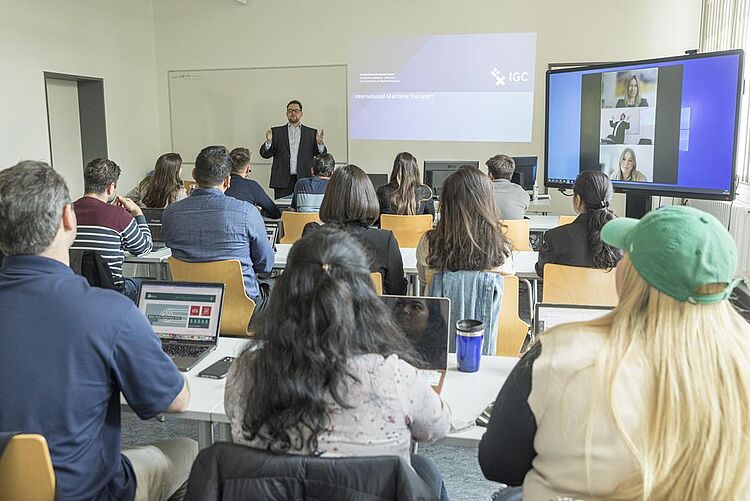| Degree | Master of Arts - 90 ECTS |
| Start | October 2024 |
| Application deadline | July 31, 2024 - Apply now! |
| Accreditation | HSB City University of Applied Sciences (public), AQAS |
| Requirements |
*210 ECTS are required for applicants from the European Higher Education Area (EHEA). Applicants from Europe with 180 ECTS can be admitted under the condition of a mandatory internship of at least 22 weeks as part of the study program, which can be completed in the 3rd semester. An equivalence check is carried out for all others. |
| Language | English |
| Duration & Type | 3 semester / full-time on Campus in Bremen |
| Group size | max. 25 students |
| Tuition fees & payment | Total of €14,900* / With our Early Bird II Discount: Total of €14,150* - First Payment of €1,500 until July 31, 2024. Monthly installments available. See our payment plan for details. *plus €330 student- and semesterticket twice a year |
Your Master Management - Digitalization & Transformation
Navigating the Future of Innovation
In our fast-paced, increasingly digitized world, it is important for companies to remain competitive to continuously question their business models and drive innovation. This leads to fundamental changes in corporate processes. (Digital) transformation is defined as the integration of digital processes across all business areas. We aim to prepare you for this! Whether you dream of starting your own company or taking over an existing one, our program provides the ideal foundation. We will take you on an exciting journey through the lifecycle of a business: from inception and growth to consolidation and restructuring - each from the perspectives of digitalization and transformation.
At IGC, you will explore various scientific theories, work on case studies, engage in discussions from different perspectives on various issues, and develop innovative solutions to build an application-oriented management perspective. You will delve into topics such as emerging technologies, data-driven decision-making, business process optimization, organizational change management, and customer experience enhancement. You will also have the opportunity to define and delve into your own focus favorite area within an individual transformation project.
Perspectives
Graduates of this program will become specialists who are able to develop and execute digital transformation initiatives across a range of industries, including technology, finance, manufacturing, retail and beyond. You will equipped to drive innovation, improve operational efficiency and develop customer-centric strategies that deliver exceptional results. You will also have tools at hand for times of crisis. Embrace the future of innovation and let us help you take your next career step!
International graduates can use Germany's job-seeking visa to prepare for their next career step.
Benefits
- International Student Assistance (ISA)
- Company talks
- One-week excursion
- Joint research combined with academic excellence
- Internship option
- International network
- Free German language courses (optional)


![[Translate to English:] Zwei Studierende des Masters Management Digital Transformation [Translate to English:] Zwei Studierende vor dem IGC Gebäude](/fileadmin/_processed_/6/5/csm_two_igc_students_in_front_of_the_building_5284f9fa1e.jpg)
![[Translate to English:] Gruppe von Studierenden des Masters Management Digital Transformation [Translate to English:] Gruope von Studierenden vor dem IGC Gebäude](/fileadmin/_processed_/b/5/csm_group_of_igc_students_in_front_of_the_building_f9b165a361.jpg)

We are here for you!
Program Director
Prof. Dr. Vera de Hesselle
T: +49 421 5905 3499
E: vera.dehesselle@hs-bremen.de
Business model development and innovation in digital competition
- Basics and procedure of business model development,
- Analysis and evaluation of business models,
- Fundamentals of digital business models, ecosystems and platform economy (national/international),
- Innovative technologies and strategies for the successful implementation of digital business models,
- Digitalization strategies and best practice examples from different sectors,
- Assessment of the feasibility of (new) digital business models,
- From the idea to the new business model: Techniques and methods of innovation management,
- Transformation of business models: Strategies for implementing new business models.
Digital Sales and Marketing Strategies
- Basics in Digital Marketing
- Analysis and evaluation of customer journeys
- Omnichanneling
- Digital service offerings
- Development of integrated digital communication
- Digital Pricing
- eCommerce
- Measuring success in digital marketing
- Trends in digital marketing nationally and internationally
Data Science and Methods
Data Science
- Scientific research methods in economics and their application in economics and business administration;
- Analysis and interpretation of research results, multivariate analysis methods with linear and non-linear (regression) models;
- Empirical methods for testing causal relationships with and without experiments;
- New research methods and scientific working techniques used in current scientific analyses.
Methods
- Scientific working techniques in dealing with German and English digital and non-digital literature sources;
- Handling and evaluation of sources, their monitoring and analysis;
- Current scientific case studies.
Cyber Risks and Data Protection
- Technical, social, political, and economic dimensions of data protection, data security and current challenges of corporate digitalisation in a global context
- Business reasons and requirements for digital compliance management
- Constitutional foundations, historical development, systematics and basic principles of cyber security and data protection in the national and European context
- Legitimisation of data processing and its design in practice
- Technical and organisational data security measures
- Dealing with sensitive categories of data
- Corporate data protection management, in particular the correct handling of data subjects' rights
- International data transfer, cloud computing, international legal references
- Administrative responsibilities and sanctions
- Introduction to Data Security Compliance
- Current national and European cyber security legislation
- Interfaces of law and technology, technical norms and standards
- Outlook for the further regulatory horizon on cyber security and data protection.
Supply Chain Management and Digital Transformation
Digital Transformation & Analytics
- In-depth insights on digital transformation in the supply chain
- Examine the process contributing to the transition to a digital society and economy
- Information technology/systems concepts for providing the necessary data and information for business analysis and the digital technologies required for integration into the business
- Role of data in the digital transformation
- Techniques of statistical analysis, prediction/extrapolation, predictive modelling, optimisation and simulation
- Regression models and time series analysis
- Application with case studies
Operations and Supply Chain Management
- Concepts, principles, problems and practices of operations and supply chain management
- Building the competitiveness of a company
- Adaptable supply chain strategies
- Innovative and flexible solutions for the changing business environment
- Operations strategy, process design, capacity planning, site selection and design, production planning, inventory control, global supply chain design, procurement, transportation and logistics, inventory and warehousing
- Recent supply chain innovations, aspects of sustainability (e.g., sustainable procurement, green logistics, circular supply chains)
Business Information, Management and Taxes
Business Information Management
- Business Intelligence using selected case studies
- Analytical data management
- Deepening of various BI tools
- Case studies and discussions.
Taxes
- National and international online trade and digital implications in tax law
- Current income and VAT rules in transformation processes using selected case studies
- Transformations of companies and their consequences in German tax law
- Forms of companies and the special features of domestic and international tax law
- Case studies, judgement reviews and discussions.
Transformations in Human Resource Management
- The role of human resource management in change and transformation
- Core functions of human resource management
- Organisation of personnel work
- Organisation and complexity
- Competence development and retention management
- Change, transformation, and culture
- Change management
Corporate Finance and Investment in Transformation Process
Growth and financing
- Market imperfections and their influence on corporate financial decisions;
- Agency conflicts between management and equity and debt and their resolution;
- Meaning, distribution and their respective consequences on capital structure;
- Use of financial innovations in financing (e.g. FinTechs, Blockchain, IPO vs ICO).
Change and Process Management
- Impact of the digital transformation on the company organisation
- Capture business processes with digital tools
- Data evaluation and identification of approaches for process modelling and improvement
- Use and evaluation of tools for process digitalisation
- Methods for digital business process modelling
- Digital process management: process analysis, controlling and implementation with change management
- Digital process optimisation with process simulation and process mining
International Transformation Management
- Concepts from the field of international management
- Concepts from different management areas with reference to the international transformation context framing digitalisation issues or the domestic context of the respective host country
- Concepts of intercultural management and intercultural competence
Corporate Restructuring
- Methods for analysing the need for, ability to and merit of restructuring
- Methods and instruments of financial and performance restructuring and transformation within and outside insolvency
- Preparation of restructuring concepts both before insolvency and in the context of insolvency plan proceedings
- Implementation and monitoring of restructuring concepts as well as transformation controlling
- Legal and tax framework of insolvency and restructuring
- Labour law particularities in the insolvency of the company and consequences in transferred reorganisations
- Transfer of undertakings and validity of collective agreement and works agreement
- Establishment and management of employment and recovery companies
Individual Transformation Project
- Methods for identifying and analysing corporate transformation opportunities related to an individual focus (e.g., internationalisation, digitalisation, transformation, sustainability, data protection, supply chain, etc.)
- Methods and instruments to transform the operational challenge into a research and project issue
- Preparation of project outlines depending on the individual focus
- Supervision of project implementation incl. time management
- Preparation and implementation of structured feedback
Master Thesis
The Master's thesis is written in a subject area of the student's choice that is related to the degree program.
By writing the Master's thesis, the student should show that he/she is able to work independently on a problem in a scientific and professional manner within a given period of 13.5 weeks.
On the basis of a given question or a question agreed upon with the supervising teacher, the student is to structure the topic independently in a meaningful way and work on it scientifically. In addition to self-study, this is also done with the help of counselling interviews with the supervising teacher and a Master's thesis seminar, in which the students receive instructions for further deepening the scientific method they have chosen, as well as reporting on and discussing the status of their work.
Independent, structured and competent scientific processing of own task areas and topics - as a direct professional qualification.
Information for students
A warm welcome! We look forward to welcoming you as a student of the Master program in Management - Digitilasation and Transformation. Here you will find important information and things worth knowing for your start of your studies with us.








![[Translate to English:]](/fileadmin/_processed_/3/9/csm_20_years_IGC_06_12_2024_nw_8614_72c43ff39c.jpg)
